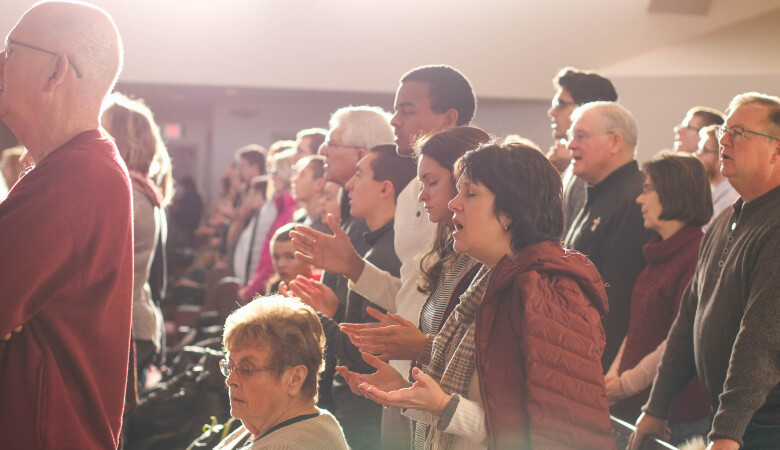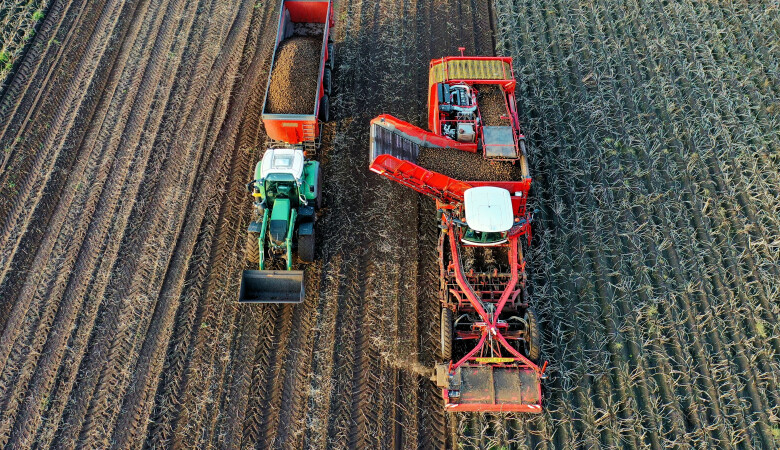God's Warning to Rich Oppressors (James Sermon 10)
March 15, 2020 | Andy Davis
James 5:1-6
Works of the Flesh, Warnings, Judgement Day, Second Coming of Christ, Money and Possessions, Good Works, Hell
Introduction
Do Not Fear the Virus
These are certainly extraordinary times, we know that this virus is affecting life all over the world, as I just prayed. We know that cruise ships have been quarantined, people have had a hard time getting back into their countries as they've been traveling internationally. We know the stock market lost roughly 20% of its value, and we know that specifically to us, worship services just like this one are canceled all over the world, across the country and across the world. These are extraordinary times. Just checked a website a few moments ago. The world count is over 162,000, the world death count over 6,000. But beyond that, there's a terrible fear of the unknown. And it's remarkable as we're moving through the Book of James, and we see the providence of God as last week we had the opportunity to study James 4:13-17, and we're reminded that we don't know what will happen tomorrow as Andy just mentioned a second ago, our life is a mist, it's a vapor. Instead we ought to say, "If the Lord wills, we will live and do this or that.” And we need sometimes these reminders that everything we see around us is temporary. This physical world is temporary, but the next world is not temporary.
We need to be reminded of that because the five cents world in which we live presses in on us every day, and it's hard to live by faith. We see our physical needs that press in on us, our pains, our aches, different things come in, and we're mindful of the fact that this world shouts and clamors for our attention. And sometimes we need to be reminded that this world is temporary but our souls are eternal. And if you're watching this livestream today and you know that you're not yet born again I would urge you to consider what Jesus said, "What would it profit someone if he should gain the whole world and forfeit his soul?" Or what would someone give in exchange for their soul? Your soul is worth more than the whole world. And Jesus at one point was talking about persecution, so I'm going to transfer it a little bit to the virus where he said, "Do not fear those who kill the body and after that there's nothing more they can do to you, but I'll tell you who to the fear, fear the one who after the death of the body has the power to destroy both soul and body in Hell." Yes, I tell you fear him.
So what I would say to that is, "Let's not fear the virus ultimately, we're all going to die of something. But if you are not yet a believer in Christ, you should fear death because the Bible reveals plainly, “it is appointed for each one of us to die, and after that, to face judgment.” And the good news of the Gospel is that God sent his Son, the lord and savior Jesus Christ into the world to live a sinless life, he was fully God, fully man, “to be tempted in every way, just as we are, yet was without sin,” but ultimately to give His life as a ransom for many. And that He was raised from the dead on the third day, meaning that Christians never need to fear death again. That if we're Christians, we know that there is no condemnation for those who are in Christ Jesus, we don't fear death because we know that Judgment Day, we will not be condemned. But what about you, dear friend? Have you come to faith in Christ, have you trusted in him for the salvation of your soul?
I. Rich Oppressors Wanted
The Most Dreadful Passage in James
Now, as we move through the Book of James we're coming to one of the most convicting passages in the entire Bible. You just heard it read, it's a severe warning that Almighty God is giving to the entire human race through his servant, James, by the power of the Holy Spirit. It's a warning to rich oppressors. And as you read these words that you just heard read a moment ago, these are words that really could cause sheer terror if you take them seriously. They are words that actually offer no hope whatsoever just within these verses. There's no actual call to repentance, there's no promise of forgiveness of sins, if you do. It's just a stark warning. Now, there are words of comfort and consolation in other places in the Bible and they're true as well, but here, just a severe warning. "Now listen, you rich, weep and wail because of the misery that's coming upon you."
Threatened with Eternity in the Fire of Hell
And as you look at the text as well, the Lord Almighty, the Lord of Hosts is summoned, is mentioned, the commander of the armies of Heaven mobilized against these rich oppressors. And what is threatened in this text is nothing less than eternity in the fire of Hell. "Weep and wail,” the text says, "because of the misery that's coming upon you." This weeping and howling certainly reminds me of Jesus' description of the suffering of the torments of Hell in many places, but Matthew 22:13. It says, "Tie him hand and foot and throw him outside into the darkness where there will be weeping and gnashing of teeth." So, for me as I read this text I think about that, the warnings about Hell and what it's going to be like. Jesus warned sinners many times about that, the misery that is coming upon you. The word misery is actually an eternal, infinite understatement for Hell's fire. The Book of Revelation speaks of a Lake of Fire. And Jesus says that the worm does not die and the fire is not quenched. The Book of Revelation, Revelation 14:11 says, "The smoke of their torment rises forever and ever. There is no rest, day or night,” for those that are suffering the torments of Hell. And the text says, your flesh will be “eaten like fire.” This is the effect of being thrown in the Lake of Fire, yet, when it says the worm does not die, the flesh is not consumed, it doesn't ever end. It goes on forever and ever, it's a severe warning.
It reminds me also of Jesus' parable of the rich man and Lazarus in Luke 16:19-25, there the text says this, "There was a rich man who was dressed in purple and fine linen and lived in luxury every day. And at his gate was laid a beggar named Lazarus who was covered with sores and longing to eat what fell from the rich man's table. Even the dogs came and licked his sores. The time came when the beggar died and the angels carried him to Abraham's side. The rich man also died and was buried, and in Hell where he was in torment, he looked up and saw Abraham far away and Lazarus by his side, so he called him, ‘Father Abraham, have pity on me, send Lazarus to dip the tip of his finger in water and cool my tongue because I am in agony in this fire.’ But Abraham replied, ‘Son, remember that in your lifetime, you received your good things while Lazarus received bad things. But now he is comforted here and you are in agony.’"
So I think there's a lot of similarities between that parable which continues beyond that point but also James Chapter 5. It says also that these rich individuals have fattened themselves in the day of slaughter. Listen to James 5:5, "You've lived on earth in luxury and self-indulgence, you have fattened yourselves in the day of slaughter." What an image that is? You've fed your flesh in such a way that it would attract special notice from the judgment of God. The image that's in my mind is of a lightning rod, which is specially designed by the engineers to be very high up on a building and attract the lightning strike. The image is more of, I think, of a pig pen and of hogs, pigs different ones, and you can imagine one very large hog that shoulders all the other pigs out of the way and just eats and eats until its stomach is full, and then the others can get whatever's left. And then when the time, the day of slaughter comes, that hog will get special attention. On the day of slaughter, it grew fatter and fatter and did not realize what was coming.
James as a Prophet of Doom
So this text speaks therefore of the inevitable outcome for rich oppressors: slaughter. And a slaughter that does not last for an instance but for all eternity. So James really is standing here as a prophet of doom. As he speaks to these rich individuals, these rich oppressors, he stands in a long lineage, a powerful heritage of prophets whom God raised up to speak a word of warning. Now though there are no words of mercy in the text, there's no command to repent, there's no opportunity for forgiveness in the text, yet there's still hope because God is warning people ahead of time, and there is implicit in that warning, an opportunity to repent while there's time and to find salvation through faith in Christ. But Old Testament prophets did this again and again.
Think of Isaiah 5:8-9 says, "Woe to you who add house to house and join field to field till no space is left and you live alone in the land. The Lord Almighty has declared in my hearing, surely the great houses will become desolate, the fine mansions left without occupants." Or again, later in that same prophecy, Isaiah 10, verses 1-4, “Woe to those who make unjust laws, to those who issue oppressive decrees to deprive the poor of their rights and withhold justice from the oppressed of my people, making widows their prey and robbing the fatherless. What will you do on the day of reckoning when disaster comes from afar? To whom will you run for help? Where will you leave your riches? Nothing will remain, but to cringe among the captives, or fall among the slain. Yet for all this, his anger is not turned away, his hand is still up, raised.” Isaiah 10:1-4. Or again, the prophet Amos had much to say about social injustice and oppression in Amos 2:6-7, this is what the Lord says, "For three sins of Israel, even for four, I will not turn back my wrath, they sell the righteous for silver and the need for a pair of sandals. They trample on the heads of the poor as upon the dust of the ground and deny justice to the oppressed." Or again later, Amos 5:11-12, "You trample on the poor and force him to give you grain, therefore though you have built stone mansions you will not live in them. And though you have planted lush vineyards, you will not drink their wine, for I know how many are your offenses and how great your sins. You oppress the righteous and take bribes and you deprive the poor of justice in the courts." So James stands on the shoulders of this lineage, of prophets of the Lord, prophets of doom who came along to warn rich oppressors of the judgment that was certainly coming on them.
Jesus’ Warnings About Earthly Wealth
Jesus also warned of the dangers of wealth in this present age. In the parable of the seed and the soils, you remember the thorny ground soil, and what happened to the seed there, Mark 4:18-19, "Still others like seeds sown among the thorns hear the word but the worries of this life and the deceitfulness of wealth, and the desires for other things come in and choke the word making it unfruitful." Or again, Luke 6:24-25, Jesus said, "Woe to you who are rich for you have already received your comfort. Woe to you who are are well-fed now for you will go hungry. Woe to you who laugh now for you will mourn and weep." And again in the passage about the rich young ruler as you remember who came and could not give up his wealth to become a follower of Jesus, he turned away and went away sad. Jesus said, to his disciples, Matthew 19:23-24, "I tell you the truth, it is hard for a rich man to enter the kingdom of Heaven. Again, I tell you, it is easier for a camel to go through the eye of a needle than for a rich man to enter the kingdom of God." The disciples were amazed at that moment and said, "Who then can be saved?" And Jesus said, giving great comfort to us, "With man, this is impossible, but with God all things are possible."
Now we, in our present age here in America, we are all about accumulation, all about wealth acquisition. Jesus warned about this, in Luke 12:15, he said, "Watch out, be on your guard against all kinds of greed, a man's life does not consist in the abundance of his possessions." It seems like Madison Avenue and Internet, Amazon Prime, all of that set up to try to refute that. “Actually your life does consist in the abundance of your possessions.” We're basically sold that every day and we have to swim upstream against that constantly.
II. Rich Oppressors Described
There is Nothing Intrinsically Wrong with Wealth
Alright, so, as James addresses this, he just says, "Woe to you rich" or he says, "Watch out, and now listen you rich," he doesn't add anything. I say that this is a severe warning against rich oppressors. There's nothing intrinsically wrong with wealth per se, it is tempting, but just because you're wealthy it doesn't mean you're going to Hell. Deuteronomy 8:17-18 says, God gives wealth, He gives us the ability to make it. Listen to what he says, "You may say to yourself, 'My power and the strength of my hands have produced wealth for me. But remember the Lord your God, for it is He who gives you the ability to produce wealth.'" So if there's something wrong with producing wealth, then that would not be spoken in that way. God wouldn't give us the ability. It is essential for us to earn money just to provide for our families, and meet our own basic needs. As a matter of fact, 1 Timothy 5:8 says, "If anyone does not provide for his relatives, and especially for his immediate family he's denied the faith and is worse than an unbeliever.” So, it's vital for believers to provide for their immediate family. Later in that same passage, it's talking about widows who need care from the church versus those that shouldn't need care from the church. And he said, "If any woman who is a believer has widows in her family she should help them and not let the church be burdened with them so that the church can help those widows who are really in need." So it's vital for every family unit to stand on its own two feet financially and not burden the church. And in order to do that you have to acquire wealth.
Also the scripture makes it plain that it's wise to store up some money for the future. You can't live day-to-day, I said this last week, in James 4. We can't assume that there won't be life tomorrow, that life will almost certainly end today. That's different than presuming upon tomorrow. So as I quoted last week, again today, Proverbs 6:6-8, "Go to the ant you sluggard, consider its ways and be wise, it has no commander, no overseer, no ruler yet it stores up its provisions in summer and gathers its food at harvest.” So there's nothing wrong with having barns, having storage units, having a bank account or even having a retirement. Although we've seen what the virus can do. Twenty percent of people's retirement down in value in one week. Twenty percent. As the scripture says, "Cast but a glance at riches and they fly away." We know and we should know anyway if we're biblically mature we can't rely on money. But it's not wrong to accumulate it to a point. We should realize that God gives us the ability to produce an abundance more than we need for our immediate needs essentially so that we can share it with others. As 2 Corinthians 8:15 says, "He who gathered much did not have too much, and he who gathered little did not have too little."
Rich Oppressors Hoard Wealth Until It’s Useless
But the rich oppressors that are being addressed in this text have no such view of their wealth, not at all. It's not for other people it's all about them. That's the way they think. Their God was their money, and they did whatever they could possibly do to gain more and more, no matter what the human cost, and that's the whole point here. They hoarded their wealth until their wealth became useless. Hoarding is accumulating a pile of silver and gold, just watching it grow as though it had some intrinsic value to bring happiness.
Think about Ebenezer Scrooge who was overwhelmingly accumulating wealth. He was a miser. He didn't spend his money on himself even, he just watched the pile get bigger. And so James says in verse 2-3, "Your wealth has rotted and moths have eaten your clothes. Your silver and gold are corroded, their corrosion will test against you and eat your flesh like fire. You have hoarded wealth in the last days." The image that James uses here is devastating and a bit ironic actually, speaks of wealth rotting. The only things that rot are living things, so he makes their wealth as though it were alive, and it had a prime moment like a piece of fruit or vegetables to be eaten and then it went way past that.
Remember how God provided the manna for the Israelites every single day, you remember that story. As they're in the desert and God miraculously fed them. And when He began that process of feeding them with manna, bread from Heaven, which they were supposed to go out every day and collect except for the Sabbath Day, that was an exception. But every normal day, they were just to go out and collect what they needed for that day. And God was very plain about that. He said, "Just collect what you need for yourself and your family, and do not store it overnight." But some of the Israelites didn't listen. They didn't follow the instructions, and so they hoarded it for the next day. And when they went to eat the next day, it was covered with maggots and it stank. So you get the image of wealth like that. It was hoarded and became maggot-covered and it stunk.
He also says that their precious metals, their gold and silver, have rusted. Which is really ironic because anyone who knows anything about gold say, "No, it doesn't rust, ever. It could be around for a thousand years and it's still shiny." Silver gets a black kind of sheen on but it can be wiped off, it doesn't rust straight through. But James uses that kind of language. It corrodes all the way through. It definitely reminds us of the words of Jesus in Matthew 6:19-21, "Do not store for yourselves treasures on earth where moth and rust destroy and where thieves break in and steal. But store up for yourselves treasures in Heaven where moth and rust do not destroy, and where thieves do not break in and steal. For where your treasure is, there your heart will be also." So basically, the idea is material wealth has a shelf-life, spiritually. A spiritual shelf life, think of it that way. Your material wealth has value in this present age, as it's in service to the glory of God and to the benefit of your neighbor. But if you hoard it, it goes bad. It has a shelf life.
I remember recently, I think it was last week, hearing about a pastor in England who was helping his very elderly mother who lived in the same cottage, I think, for a long time. Went into her pantry and found an array of canned goods, and found a drink in the back that was best to be drunk by December of 1987. So I think he felt it was best to throw that out. I think you would agree that was a wise decision. That's why I think of shelf life. Wealth comes into your life, you've got a window of opportunity to use it for the glory of God, especially by helping others. God doesn't need money. And James says, "If you don't do that, it's going to go beyond its Use By date. And that fact, that spiritual corrosion, that spiritual rot will testify against you on the Day of Judgment.” That's what he's saying. They hoarded wealth in the last days.
Now, some people, I've actually had two people that have emailed me wondering if the coronavirus was evidence that we were in the last days. But we don't need the coronavirus. The scripture again, again like this passage here says, "We are in the last days." And we've been in the last days for 2000 years. The next thing that's going to happen, big picture, is the second coming of Christ. Judgment Day is coming. So, we're in the last days. If you're asking me, do I believe that the coronavirus shows that we are the final generation, that I cannot tell. Could very well be a year from now, we'll just remember this is an extraordinary time, but the thing, and we're praying for this, will just recede. But in any case, the last days are here, and this is a terrible time to be hoarding wealth because the last days have come.
Rich Oppressors Often Gain Wealth by Injustice
Now, I call them rich oppressors because they gain their wealth by injustice. Look at verse 4. "Behold” or “Look, the wages you fail to pay the workers who mowed your fields are crying out against you. The cries of the harvesters have reached the ears of the Lord Almighty." That's why I call them rich oppressors. They not only hoarded wealth, they gained it through injustice. They have the power enough to defraud their workers who brought in their harvest, to defraud them with impunity. They had gamed the system so much through bribery and maybe the judges are part of the whole thing, and there was nothing these poor people could do. Maybe they just simply held on to the wage for a week or a month, and then eventually paid it or paid a portion of it. In any case, it was rank injustice.
Now, the Law of Moses set up a very clear command, a set of commands, about wealth owed to workers. Pay it immediately. Pay it when you said you would pay it. Pay it when they're expecting to get it. Leviticus 19:13 says, "Do not defraud your neighbor or rob him. Do not hold back the wages of a hired man overnight." Just not even overnight. Again, Deuteronomy 24:14-15, "Do not take advantage of a hired man who is poor and needy. Whether he's a brother Israelite or an alien living in one of your towns." “Pay him his wages each day,” listen to this, “before sunset, because he is poor and is counting on it. Otherwise, he may cry to the Lord against you, and you will be guilty of sin.” That's the backdrop of the very thing James is saying. "They've cried out to God against you and God is interested." That's a threat. The Lord Almighty has heard their cries. I can't help but think of the injustice of chattel slavery and the wealthy plantations that are part of the history of our nation in which slave owners got wealthy on the backs of their slaves and never paid them a cent for their back-breaking labor out in the fields.
I was reading recently an article about the wealth of Charleston, South Carolina. It was called Carolina's Gold Coast, it was speaking of rice plantations. From the 1720s to the 1860s, the rice plantations shaped and reshaped the Low Country geography there in the area around Charleston, South Carolina, and it made Charleston one of the richest cities in the world. Certainly, indigo, cotton, forest products, other manufactured goods, contributed to the economy, but nothing came close to the lavish wealth brought in by rice. But it was all predicated on slave labor. Slaves had used rough tools to clear immense wooded swamps, then they constructed massive hydrological systems, dams, dikes, floodgates, sluice gates, those kinds of things used to properly irrigate the rice fields. Then they had to plant the rice plants with their backs bent over double, and then when the plant stocks grew tall, they had to weed. Weeding rice fields in the blazing sun, and the overpowering humidity was torturous work. And after weeks of soaking rain, the Carolina gold rice, the stocks were waist-high, but tall weeds also grew up, threatening to smother the harvest. And so the slaves had to get in there and pull each of those weeds by hand. To make matters worse, these low-lying swampy areas were breeding grounds for malaria and yellow fever, and the mosquitoes that carry them. Thousands of slaves died of these diseases.
Their Wealth Was Self-Indulgently Spent
In the 18th and 19th centuries, the Carolina Low Country was the deadliest disease region in the North American mainland. Some said at that time, South Carolina was a paradise in the spring, a hell in the summer, and a hospital in the fall. After working brutally long days, the Low Country slaves were still required to grow their own food, make their own clothing because, of course, they were paid nothing for their labor. And they lived in rags and they suffered from near starvation while the rice plantation owners became among the wealthiest people in America. One contemporary observer wrote, "The Carolina rice plantation masters lived their lives in wanton luxury, spending their days only to make money, to dance, to gamble, to run horses while the women only wanted to spend money, play piano, and contemplate their own beauty." Many of them live more or less permanently away from their own rice plantation, so they never saw the back-breaking labor of the slaves that enabled them to live their luxurious lifestyles. Some of them had incredible homes on The Battery in Charleston, some of the most elegant mansions in America.
To some degree, the Charleston rice plantations led the way in relying on slave labor long before cotton was the main staple of Southern wealth. So here again, the words of James. And see how they fit. "Behold, the wages you fail to pay the workers who mowed your fields are crying out against you. The cries of the harvesters have reached the ears of the Lord Almighty. You have lived on earth in luxury and self-indulgence, you have fattened yourselves in the day of slaughter." And in the text, their wealth was self-indulgently spent. There's a life of luxury. The best clothing, the most affluent lifestyle. They spared themselves no luxury. They felt they deserved the best of meats and the finest of wines. And they enjoyed the life of leisure while others did their hard labor for them.
Again, I think about Amos. Amos 4:1-2 says this, "Hear this word, you cows of Bashan on Mount Samaria, you women who oppress the poor and crush the needy and say to your husbands, 'Bring us some drinks.' The sovereign Lord is sworn by his holiness. The time will surely come when you will be taken away with hooks, the last of you with fish hooks." And again, Amos 6:4-7, "You lie on beds inlaid with ivory and you lounge on your couches. You dine on choice lambs and fattened calves, you strum away on your harps like David, and you improvise on musical instruments. You drink wine by the bowl full, and you use the finest lotions, but you do not grieve over the ruin of Joseph. Therefore, you'll be among the first to go into exile. Your feasting and lounging will end." The day of the slaughter comes on people who live like this. Their self-indulgence has just been storing up wrath against them. As Paul says in Romans 2:5-6, "Because of your stubbornness and your unrepentant heart, you're storing up wrath against yourself for the day of God's wrath, when his righteous judgment will be revealed. God will give to each person according to what he has done."
Even worse, they used violence to gain wealth. Look at verse 6, "You have condemned and murdered innocent people who are not opposing you." So they're willing to go to the nth degree, condemning and murdering. I think about wicked king Ahab, you remember who together with his wicked wife Jezebel, plotted to take the vineyard of Naboth, the Jezreelite. He didn't want to sell to them. And so Jezebel especially, but Ahab was a willing accomplice, orchestrated Naboth's murder by having some worthless men accuse him of cursing both God and the king, and then use the justice system to execute him, and then they came and took the vineyard.
Honoré de Balzac, French writer, said, "Behind every great fortune, there is a crime." Behind every great fortune, there is a crime. Mario Puzo began his novel, The Godfather, quoting these words, speaking of the fictitious crime family, the Corleone. Now, this may be an overstatement. It is an overstatement. There are some wealth, there are some wealth that's accumulated without crime. I think about how wealthy Job was, and he was blameless and upright, a man who feared God. Abraham was quite wealthy, and he acquired his wealth without crime. But it stands, and we must imagine around the world today, in ways that are appropriate to our 21st century setting, in which chattel slavery is illegal, should be. There is still economic oppression going on in ways we can hardly imagine. And so these words from James are living and active today.
III. How Christians Should Read this Warning
Who is James Writing To?
Alright. Now, the question in front of us is, how should we, Christians, hear this text? How do we read this? Who is James writing to? Is it actually possible that someone who lives like this could, at the same time, claim to be a Christian? Now, many commentators say James is writing to churches. And so therefore, he thinks there are certain people that are attending Christian worship that are secretly living this kind of life. And it is quite possible that even now, all over the world, in the 21st century, there are people that are getting wealthy through this kind of oppression. Going on now. And yet they're claiming to be Christians. So people like that just need to read this warning, and heed it, and flee to Christ while there's time.
I think about the Zacchaeus. And even though there's no promise of mercy or grace in the text, yet, think about what happened with Zacchaeus, the chief tax collector who was defrauding people every day. And when he heard of the grace that was available, as Jesus was a friend of tax collectors and sinners, he invited Jesus to come to his home. Actually, Jesus invited himself over. "I must eat with you today." And Zacchaeus said, "Look, Lord. Here and now, I give half of my possessions to the poor, and if I cheated anybody out of anything, I will pay back four times the amount." Jesus said to him, "Today, salvation has come to this house because this man, too, is a son of Abraham." So that is quite possible.
Think of Nebuchadnezzar, the most oppressive man on planet Earth, who for some reason, I think it's because God was working through Daniel, I hope, and I trust to ultimately bring Nebuchadnezzar to a saving faith. When Nebuchadnezzar had this terrifying dream in Daniel 4, in verse 27, Daniel came and warned the king, he said, "Therefore, O King, be pleased to accept my advice. Renounce your sins by doing what is right and your wickedness by being kind to the oppressed. It may be that then, your prosperity will continue." Nebuchadnezzar was humbled to the ground. A year later, a year of oppression later, God is so patient. He was stricken, his mind was changed, he ate grass like a cow for seven years. And when he came back, he was deeply humbled. And we trust, we have no record of it, we trust that he walked in that humility and faith the rest of his life.
So if you look at your life and you realize that you have lived a life of luxury and self-indulgence, and the Holy Spirit is charging you with sin, and charging you with self-indulgence and luxury, and charging you with fattening yourself in the day of slaughter, then repent! Though there is no promise of forgiveness here, there are many others in the scriptures. Jesus came to save sinners. If you know yourself to be sick, Jesus said, "It's not the healthy who need a doctor, but the sick. I have not come to call the righteous, but sinners, to repentance."
James May Not Be Speaking to Church-Goers
Now, I do believe that James isn't necessarily speaking to people who are coming to their Christian churches. I think he was just a prophet and his eyes were on the whole world. And even whatever he understood what he was writing, the Holy Spirit certainly had a multi-generational vision to warn rich oppressors. Jeremiah was a prophet to the nations, and he spoke oracles directly against pagan kingdoms without any expectation they would read his prophecy. So also Isaiah, Amos, all the others. And James could be doing that. He's not talking to anybody who's coming to Christian church on Sunday, but just talking to the human race. It's just as likely that James is seeking to encourage the poor in his congregation, that the rich oppressors who are crushing them and dragging them into court will someday be judged by God.
Like the persistent widow, you remember that? Luke 18:7-8. "Will not God bring about justice for his chosen ones who cry out to him day and night. Will He keep putting them off? I tell you, he will see that they get justice, and quickly." So around the world, our Christian brothers and sisters are in different settings. And there may be some places where people are being directly oppressed. And they're yearning for relief. And God is using James 5, to speak a word of comfort to them that Judgment Day is coming for these rich oppressors.
IV. Application
How Should Christians View Money and Luxury?
Well, how then should we, Christians, see money? How should we see luxury? How shall we understand those things? If you have any amount of money more than you need for your basic needs, food, clothing, shelter, and that of your family, then you are technically biblically rich. And we have far more than that. We're among the wealthiest Christians that have ever walked planet Earth. And so it is good for us to read a text like this with a certain measure of fear and trembling. But we begin, I think, by being humble and thankful. In the spirit of Deuteronomy 8, it is, "Let's not be arrogant that we have wealth. Let's be thankful." Let's realize God gave us educational opportunities, he gave us gifts and talents and skills that enabled us to accumulate more money than we needed. We also lived in a country where there was freedom, there's political structure, there were things that kept anarchists from the streets and all that. It's been a blessed place to grow up and live. So Ecclesiastes 5:19 says, "When God gives any man wealth and possessions and enables him to enjoy them, to accept his lot and be happy in his work, this is a gift from God." So we should be thankful.
But beyond that, we should ask the Lord how He wants us to use our abundance for His glory. I would urge you, if you are a wealthy Christian, to read, maybe even memorize 1 Timothy 6:17-19. Listen to those words. "Command those who are rich in this present world...". Let me just stop there. Paul is talking to Timothy as a pastor, saying, "You are going to pastor wealthy people." Okay? They're not wicked going to hell because they're wealthy, but let me tell you what they should do with their wealth. "Command those who are rich in this present world not to be arrogant nor put their hope in wealth, which is so uncertain, but to put their hope in God who richly provides us with everything for our enjoyment." So, don't trust in your money. It's easier now than a couple of weeks ago to say, "Hey, we're not in a lavish expansive market now." Negative 20% in one week should teach you an important lesson. So don't trust in your money, but trust in God. "Command them to do good," 1 Timothy 6:18, "to be rich in good deeds and to be generous and willing to share. And in this way, they will lay up treasure for themselves as a firm foundation for the coming age, so that they may take hold of the life that is truly life." So be generous with your money toward the poor and needy. That's a consistent teaching. Ask the Lord to show you who he wants you to give money to.
Support the Church
Certainly, we want you, as Andy mentioned earlier, to support our church. If you're a member of First Baptist Durham, please be certain that you take the steps necessary to keep giving your tithes and offerings. We need it. Our church needs to continue to support the works that we are doing, and we've pledged to do this in our church covenant, but beyond that, there's going to be opportunities to further missions, to give to ministries to the poor and needy, to others. Ask the Lord to show you who he wants you to be generous toward. Be sacrificial. Be faith-filled. We're part of a vast conglomeration of Baptist churches that pull our money to send missionaries. And so let's be generous and keep sending missionaries to unreached people groups.
Money is Not Yours Forever
And then think about your money in the proper way. It has a shelf life. And as Randy Alcorn said, "You can't take it with you, but you can send it on ahead." So if the Lord has a block of money He means for you to give away, and you don't give it away, He may just take it from you with car repair, or a house repair, or just a negative 20% on the market, He may just take it. So when you have an opportunity to give, give. And in so doing, you will store up treasure in Heaven. As Randy Alcorn said in Money, Possessions, and Eternity, he said, "Could it be that God increases your wealth not to increase your standard of living, but your standard of giving?" So let's be faithful, let's be generous with the money that God gives to us so that we can glorify Him.
Now, as I close, I do so mindful of our circumstances here, we are facing extraordinary times. Let's ask the Lord even this week to give us a chance to share the Gospel with somebody who's afraid, afraid of dying. Be alert to those opportunities. Let's speak the words of life. Let's be a light shining in a dark place, for his glory and the spread of his Gospel.
Prayer
Close with me now in prayer. Father, we thank you for the time we've had to study your word. We thank You for the hope it gives us. We pray that you would enable us to be generous with our money, to not trust in it, to follow the clear advice in 1 Timothy 6:17-19. Father, we pray that we would make the most of the time we have and the resources that we have, but especially the Gospel. Give us a chance to share the Gospel with people who are afraid of death, so that they won't be afraid anymore, but find eternal life through faith in Christ. It's in your name, Lord Jesus, we pray. Amen.












